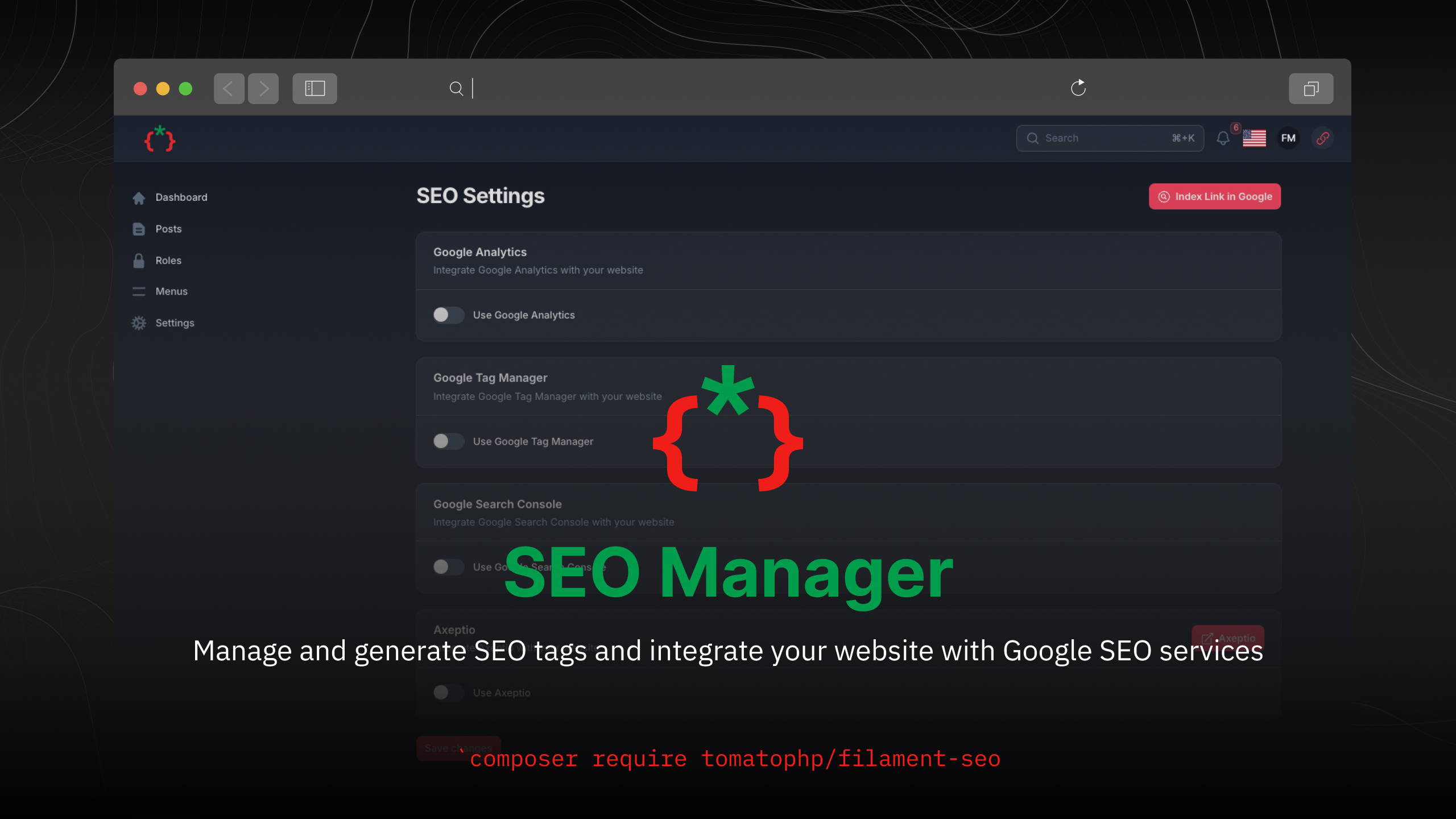filament-seo
Manage and generate SEO tags and integrate your website with Google SEO services
التوثيق

Filament SEO
Manage and generate SEO tags and integrate your website with Google SEO services
Installation
composer require tomatophp/filament-seo
after install your package please run this command
php artisan filament-seo:install
finally register the plugin on /app/Providers/Filament/AdminPanelProvider.php
->plugin(
\TomatoPHP\FilamentSeo\FilamentSeoPlugin::make()
)
on your .env add GOOGLE_CREDENTIALS to the path of your google admin service credentials file, please make sure that the account has access to Indexing API and Search Console API
GOOGLE_CREDENTIALS=
Screenshots


Features
- [x] CMS builder auto indexing
- [x] Generate SEO tags
- [x] Generate Open Graph tags
- [x] Generate Twitter tags
- [x] Generate JSON-LD tags
- [x] Integrate with Google Indexing API
- [x] Integrate with Google Search Console API
- [x] Integrate with Google Analytics
- [x] Integrate with Google Tag Manager
- [x] Integrate with Axeptio
- [ ] Integrate with Meta Pixel
- [ ] Integrate with X Business ads
Using
you can just add this blade directive to your head of your layout
@filamentSeo
and for Meta tags use
<x-filament-meta />
it will integrate everything for you and when you extend this layout you can use this sections
@section('title', 'PAGE TITLE')
@section('description', 'PAGE DESCRIPTION')
@section('keywords', 'PAGE KEYWORDS')
@section('image', 'PAGE IMAGE')
@section('author', 'PAGE AUTHOR')
@section('type', 'PAGE TYPE')
@section('category', 'PAGE CATEGORY')
@section('date', 'PAGE PUBLISHING DATE')
Allow CMS Builder Auto Indexing
we are integrate with CMS Builder to allow auto indexing for your pages, to allow this feature make sure you install filament-cms then allow this feature by use this method
->plugin(
\TomatoPHP\FilamentSeo\FilamentSeoPlugin::make()
->allowAutoPostsIndexing()
->postUrl('/blog') // your post url
->postSlug('slug') // your post slug or id
)
Use Google Indexing Jobs
we have a jobs to make it easy to integrate google indexing API on your Site like this
dispatch(new \TomatoPHP\FilamentSeo\Jobs\GoogleIndexURLJob([
'url' => 'https://example.com'
]));
dispatch(new \TomatoPHP\FilamentSeo\Jobs\GoogleRemoveIndexURLJob([
'url' => 'https://example.com'
]));
Use Filament Shield
you can use the shield to protect your resource and allow user roles by install it first
composer require bezhansalleh/filament-shield
Add the Spatie\Permission\Traits\HasRoles trait to your User model(s):
use Illuminate\Foundation\Auth\User as Authenticatable;
use Spatie\Permission\Traits\HasRoles;
class User extends Authenticatable
{
use HasRoles;
// ...
}
Publish the config file then setup your configuration:
->plugin(\BezhanSalleh\FilamentShield\FilamentShieldPlugin::make())
Now run the following command to install shield:
php artisan shield:install
Now we can publish the package assets.
php artisan vendor:publish --tag="filament-users-config"
now you need to allow it on the plugin options
->plugin(\TomatoPHP\FilamentCms\FilamentCMSPlugin::make()->allowShield())
for more information check the Filament Shield
Publish Assets
you can publish config file by use this command
php artisan vendor:publish --tag="filament-seo-config"
you can publish views file by use this command
php artisan vendor:publish --tag="filament-seo-views"
you can publish languages file by use this command
php artisan vendor:publish --tag="filament-seo-lang"
you can publish migrations file by use this command
php artisan vendor:publish --tag="filament-seo-migrations"
Other Filament Packages
Checkout our Awesome TomatoPHP